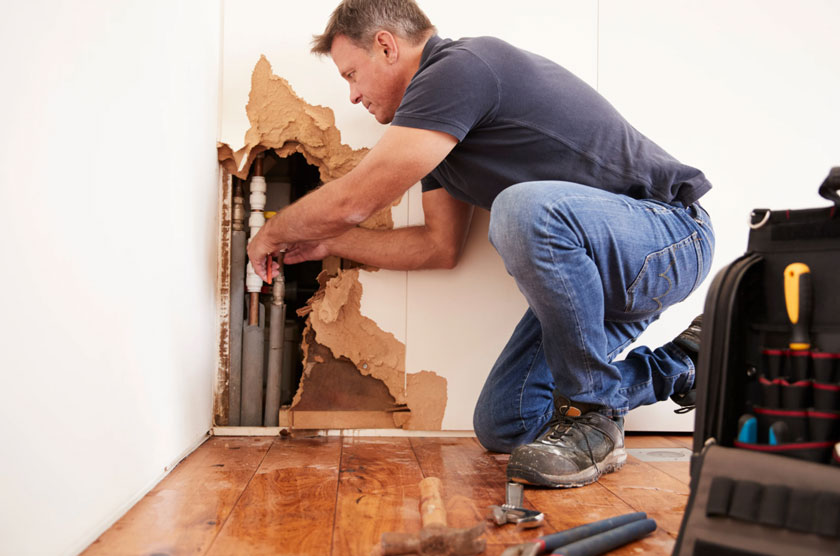As a homeowner, you take pride in maintaining your property and ensuring that it remains in top condition. However, the costs associated with home repairs and improvements can add up quickly. The good news is that some of these expenses may be eligible for tax deductions or credits, providing you with potential financial benefits.
In this comprehensive guide, you get to explore the ins and outs of home repairs and tax deductions, and other related subjects to keep you informed and empowered.
1. Distinguish Between Repairs and Improvements
2. Recognise the Home Office Deduction
3. Know the Examples of Tax Deductible Home Improvements
4. Consider the Strategies for Maximizing Tax Deductions
Recap
1. Distinguish Between Repairs and Improvements
Your home, your sanctuary and investment, holds the key to potential tax benefits, but it’s essential to navigate the world of repairs and improvements with a keen understanding. Repairs, the unsung heroes, are deductible and crucial for maintaining your property in efficient working order – fixing gutters, replacing windowpanes, or patching up cracks in the floor.
These everyday champions not only keep your home running smoothly but might also bring a smile to your face during tax season. On the flip side, improvements, the upgrades that add value and enhance your living experience, typically aren’t deductible.
So, whether you’re fixing a leaky roof or adding a room for a growing family, let your home be a source of joy and potential tax relief, where each element, from windowpanes to paint patches, plays a role in creating not just a structure but a thriving, comfortable haven.
2. Recognise the Home Office Deduction
As you navigate the intricate terrain of home repairs and tax deductions, don’t overlook the potential benefits of the Home Office Deduction, especially if you designate a portion of your home exclusively for business use. This deduction can be a valuable tax-saving strategy for home-based entrepreneurs.
Repairs and maintenance directly associated with your home office space may qualify as deductible expenses, but meeting the IRS requirements is paramount. Home-based business owners should be diligent in understanding the specific criteria to ensure compliance, potentially unlocking additional savings while maintaining a workspace that fosters productivity and success.
3. Know the Examples of Tax Deductible Home Improvements
Energy-Efficient Upgrades
Explore the realm of energy-efficient upgrades as the government extends incentives to homeowners making eco-friendly investments. These incentives cover a range of improvements, from installing solar panels to upgrading heating and cooling systems for enhanced energy efficiency. Adding insulation to your home and replacing windows and doors with energy-efficient options are also eligible for these incentives. Not only do these upgrades contribute to a greener environment, but they also open doors to potential tax credits, making your commitment to sustainability a rewarding financial endeavour. So, consider these energy-efficient enhancements not just as eco-conscious choices but as strategic moves that align with both your environmental values and potential tax benefits.
Medical Necessity Home Modifications
Delve into the realm of medical necessity home modifications, where certain adjustments made for the well-being of residents may also translate into tax benefits. Installing ramps, handrails, or modified bathrooms specifically tailored for disabled or elderly individuals can potentially qualify for tax deductions. These modifications not only enhance the accessibility and safety of your home but may also contribute to financial relief. As you prioritize the comfort and health of your loved ones, be mindful of the potential tax advantages that come with these medically necessary home improvements, turning essential adjustments into a thoughtful and strategic financial decision.
Rental Property Repairs
Embark on the nuanced journey of managing rental properties, understanding that it comes with unique considerations. Repairs and maintenance expenses incurred in the upkeep of rental properties typically qualify for deductions, providing a valuable avenue for cost recovery. Landlords, as stewards of these investments, are urged to maintain meticulous records of these expenses. This disciplined documentation not only serves as a testament to the property’s well-being but also serves as a strategic tool during tax season. By maximizing deductions and adhering to tax regulations, landlords can not only safeguard their investment but also navigate the complex terrain of rental property ownership with financial acumen.
Casualty and Theft Loss Deductions
Navigate the intricate landscape of Casualty and Theft Loss Deductions with a keen understanding of the potential relief they offer in the face of sudden and unexpected events like natural disasters. For homeowners grappling with property damage, comprehending the criteria for casualty loss deductions becomes crucial. These deductions can be a financial lifeline, aiding in the aftermath of havoc wreaked by unforeseen circumstances. Furthermore, it’s essential to recognize that theft losses may also be deductible, offering additional relief for victims of unfortunate incidents. By familiarizing yourself with the eligibility criteria and nuances of these deductions, you empower yourself to not only recover but potentially find financial solace in the wake of unexpected challenges to your home.
>>>PRO TIPS: Tax Deductions When Buying or Selling a Home
4. Consider the Strategies for Maximizing Tax Deductions
Maintain Thorough Documentation
Elevate your tax-savings game by prioritizing thorough documentation—a fundamental aspect of successfully claiming deductions. Take meticulous notes and keep detailed records of every home repair, improvement, or associated expense. This comprehensive documentation should encompass invoices, receipts, and any other pertinent records.
Not only does this practice ensure compliance with tax regulations, but it also streamlines the tax filing process, empowering you with a robust and organized record of your property-related transactions. As you embark on your journey to maximize deductions, let detailed documentation be your ally, transforming what could be a daunting tax season into a smooth and efficient process.
Ensure Regular Home Maintenance
Prioritize the longevity of your property while unlocking potential tax savings by embracing proactive and regular home maintenance. Beyond safeguarding your investment, staying ahead of issues with timely identification and resolution can prevent minor problems from ballooning into costly repairs.
The significance of this proactive approach extends to potential tax benefits, as regular maintenance expenses are typically deductible. By adopting a diligent and preventive mind-set, you not only ensure the health of your property but also position yourself for potential tax advantages, reinforcing the notion that a stitch in time not only saves nine but may also contribute to a more favourable tax position.
Contemplate Consultation with Tax Professionals
Elevate your financial strategy by recognizing the complexity and dynamic nature of tax laws. For homeowners aiming to optimize their tax savings, a prudent step is to engage with seasoned tax professionals or knowledgeable accountants. These experts, well-versed in the intricacies of ever-evolving tax regulations, offer personalized advice tailored to individual circumstances.
By seeking their guidance, homeowners can ensure they navigate the labyrinth of deductions and credits with precision, maximizing their financial benefits. In the realm of home repairs and tax deductions, the insights of these professionals become invaluable, turning a potentially overwhelming landscape into a well-charted course for enhanced financial well-being.
Think About Strategic Timing of Repairs
Be strategic with your home repairs to optimize potential tax benefits, particularly when contemplating substantial improvements. The timing of these repairs can significantly influence the tax advantages you accrue. Delve into the intricacies of tax implications associated with the timing of repairs, enabling you to strategically plan home improvement projects that maximize deductions.
By aligning your repair schedule with tax considerations, you not only enhance the efficiency of your property but also leverage the tax code to your advantage. This nuanced approach to timing transforms your home improvement endeavours into a strategic financial move, emphasizing the importance of synchronization between repair activities and tax planning for homeowners seeking optimal outcomes.
Recap
In the intricate intersection of home repairs and tax deductions, homeowners have the opportunity to optimize their financial situation. By understanding the nuances of deductible repairs, exploring energy-efficient upgrades, and adopting proactive maintenance strategies, homeowners can not only enhance the value of their property but also potentially save on their tax bill.
The key to success lies in meticulous documentation, timely decision-making, and seeking professional advice when needed. As you embark on your journey of home ownership, consider the tax implications of your maintenance and improvement activities, turning what might seem like routine expenses into valuable opportunities for tax relief. Remember, your home is not just a place of comfort and shelter; it’s also a potential source of financial benefits.








No Comment! Be the first one.